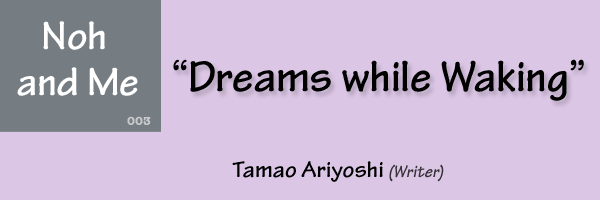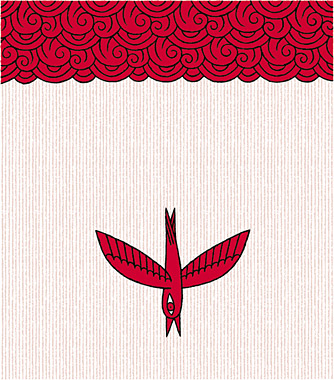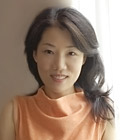 |
 |
 |
| | Home | Essay : Noh and Me | Tamao Ariyoshi |
| |
|
|
There are those who were involved with Noh from a very young age.
There are those who were attracted to Noh as adults. There are all sorts of relations with Noh.
We will be speaking with a variety of people from various walks of life about their experiences
with and relation to Noh, its attraction for them and its charms.

 |
Illustration: Takeuma |
There are people who say they get sleepy when they go to see Noh. The lack of movement and boredom may put them to sleep. But it could also be that they’re feeling comfortable and doze off. It certainly is inexcusable to be sleeping while people are on stage working hard, but to have fallen asleep because you are feeling good, can in no way be seen as being rude.
Of course, that is just an excuse in itself. For, you see, I often fall asleep as well. Or to be more specific, you’d have to say, I don’t even know if I have fallen asleep or not. Suddenly, I’ll realize that whereas the shite main actor had just been in the middle of the stage, he’s now standing by the metsukebashira marker column or over by the hashigakari gangway bridge.
It was the same this time. The play was “Utō.” The story is of a hunter, who because of his sin of taking life of a living creature during his lifetime, grieves his deed and is tormented by a bird from hell.

Most of the time the soul of the departed is soothed by the monk and then reaches a state of enlightenment. This time, however, I found that the rare tale of a hopeless situation piqued my interest. And yet...
In the first half, the monk stands before the dead hunter’s wife and child and places the deceased’s cloak and woven hat on the stage. Ah, this is for the prayers for the dead man’s soul. The cloak and woven hat must be to attract the attention of the hunter’s spirit I thought... and then suddenly, the cloak and woven hat were at the very edge of the stage.
The hunter’s ghost dances to intense, frenzied musical accompaniment. Ah, I see, this must be the kakeri dancing described in the play synopsis, the scene in which the dead man hunts the young utō. This is the interplay of the shite main actor and the music. This is the highlight. I must watch closely, I thought. Even if this part was all planned from the start, it is quite an improvisational meeting of shite and music, a kind of jazz, I was thinking, rather impressed, when suddenly my memory blanked on me again. The next thing I know, the hunter is walking noiselessly along the hashigakari gangway bridge nearly to the curtain. Eh, what’s this?! It must be over. I must have fallen asleep again.
No, I wasn’t sleeping. I clearly remembered the expression on the wife’s face. Raised up on one knee before the jiutaiza group reciters bearing to watch the agony of her husband’s spirit suffering even in death. Having killed a living creature to feed himself and his family, he is accused of his crime. And, though the expression on the mask could not have changed, it looked as if had, as if it had trembled just a bit.

And again, I thought of the hardship of human life. We must take the lives of living creatures in order to eat in order to live. All human beings are born criminals.
But, in Taiwan I encountered a way of eating known as “simple eating.” Abiding by a doctrine of non-killing, food is prepared without any animal products whatsoever. The wonderfully innovative ways of imitating the taste of meat and fish were most interesting. On the other hand, it also made me think of just how strong human desire is that people would go to such lengths just because they wanted to eat flesh. Watching Noh, I remembered all that once again.
A hunter, who because he had taken the life of a fledgling bird during his life, dies and goes to hell and is tortured by the parent bird. He becomes a ghost and tries to meet his own child, but is blocked from doing so. Parent and child... I think it was about from that point that that memory had came back to me.

When I was in elementary school, I learned to chant the Noh songs. My mother had started to learn the kotsuzumi hand drum but when I said I wanted to learn to play it too she said it was too heavy and until I could hold it I would have to chant the Noh songs. I couldn’t even read them. But my grandmother wrote things out in letters even a child could understand. I would sing my grandmother’s words such as Yuya and Momijigari without any understanding of them, while my mother accompanied me on the drum.
Simple eating, the chanting, normally things I wouldn’t remember, I would remember while I was watching Noh. Or was I dreaming?
But saying that, the dream was surely one I had because I had fallen asleep there. Or, I guess you could say, it was a dream I had while watching Noh.
With the drastically restricted movement of Noh before you, something comes back and swells up inside you. So what if that something doesn’t have a direct relation with what is happening before your eyes? The time spent with Noh, is time spent having fun, at play in one’s own world.
(September 2008)
 |
Tamao Ariyoshi Born in Tokyo in 1963. Graduated from Waseda University with a degree in philosophy and from Tokyo University with a degree in art aesthetics. Completed studies in drama at New York University Graduate School. Outstanding works are “Migawari”(On My Behalf: Days with Sawako Ariyoshi; winner of the Joji Tsubota literary prize), “Shashō-san no Koi (The Train Conductor’s Love)” and “Koi Suru Vermeer: 36 Sakuhin e no Tabi (In Love of Vermeer: Journeys for 36 Works)” |
| Terms of Use | Contact Us | Link to us |
Copyright©
2026
the-NOH.com All right reserved.